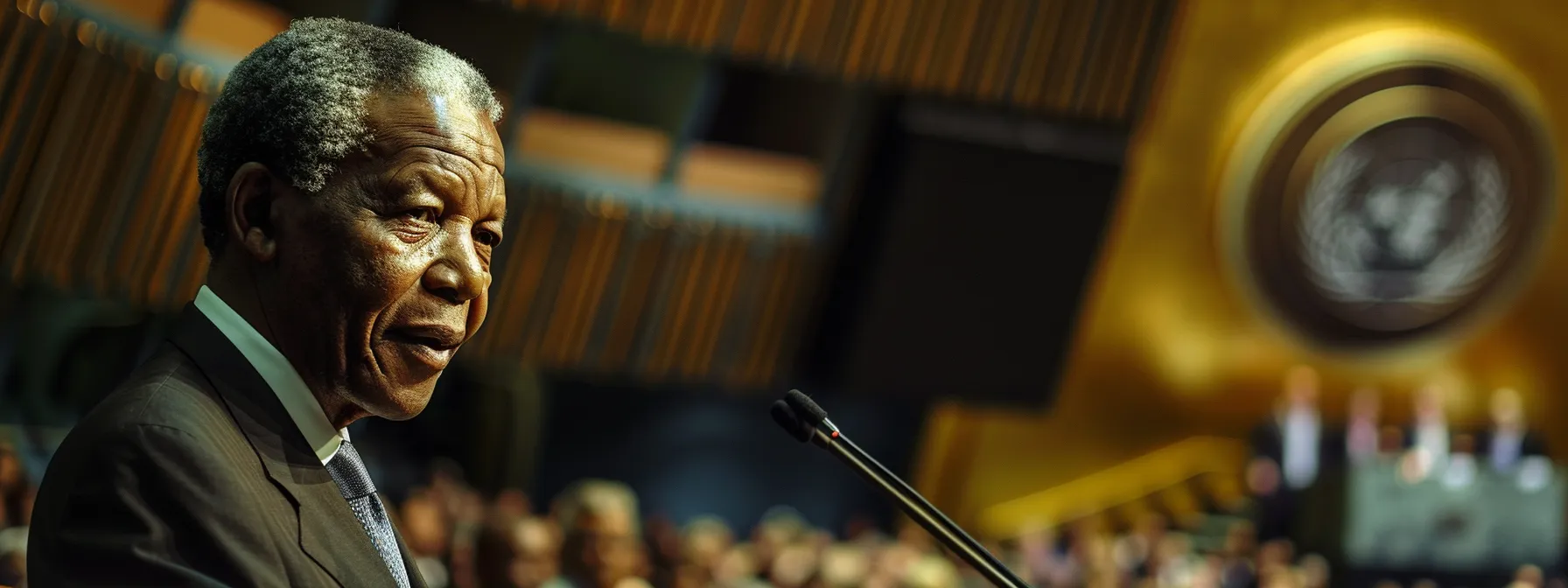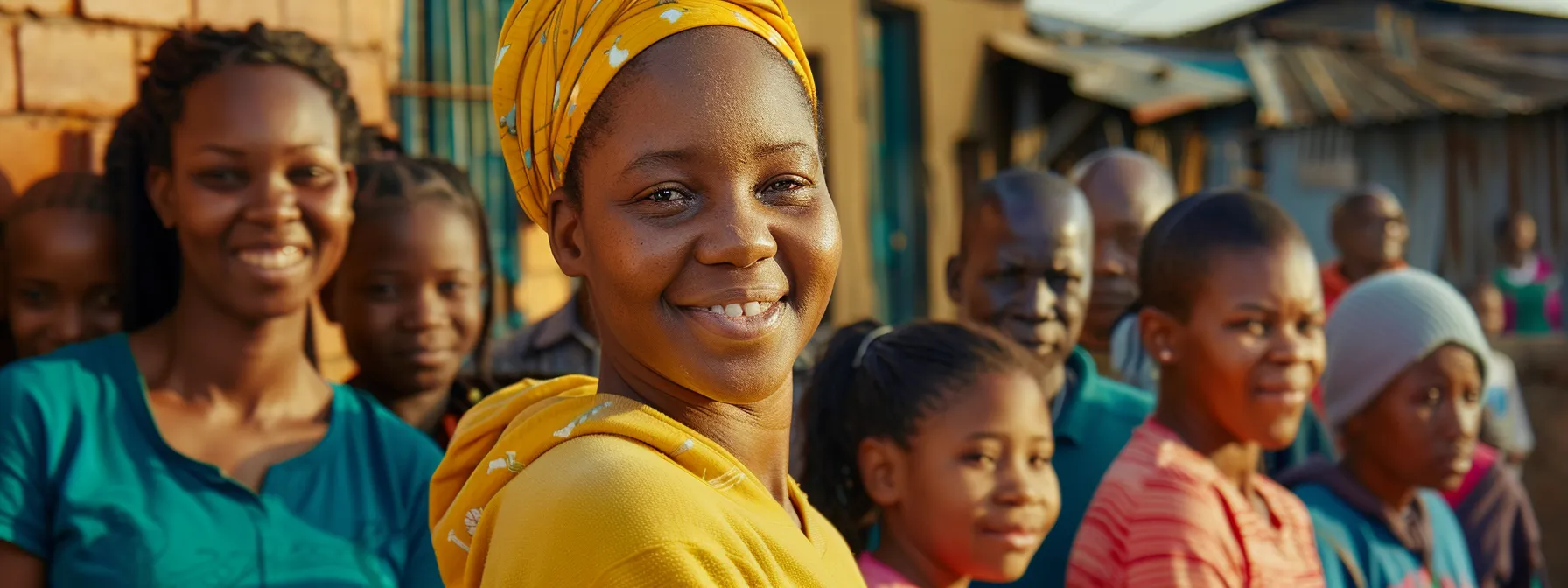Disclaimer: We sometimes use affiliate links in our content. For more information, visit our Disclaimer Page.
Nelson Mandela’s impact on global peace and democracy remains profound. Many may not realize how his early education at the University of Fort Hare instilled in him the values of activism and the rule of law. This blog post will delve into Mandela’s struggle against apartheid, his imprisonment, and the global support he garnered during this time. Readers will gain insights into how Mandela’s leadership led South Africa towards democracy and how his legacy continues to inspire protests for justice in today’s society, addressing the ongoing issues of inequality and human rights around the world.
Key Takeaways
- Nelson Mandela’s early experiences shaped his commitment to justice and social equity
- Education played a vital role in Mandela’s activism and understanding of systemic racism
- Mandela’s leadership emphasized dialogue, reconciliation, and forgiveness as pathways to a democratic society
- The Rivonia Trial highlighted global support against apartheid and showcased Mandela’s dedication to human rights
- Mandela’s legacy inspires ongoing movements for social justice and equality worldwide
Explore Mandela’s Early Influences That Shaped His Vision

Nelson Mandela’s early experiences significantly shaped his commitment to justice and democracy. His childhood instilled a strong sense of fairness and the need for social justice. Education played a crucial role in his journey as a lawyer and activist, while his involvement with the African National Congress marked the beginning of his fight against violence and oppression. These elements laid the groundwork for his later influence during the Rivonia Trial and beyond.
Discover How His Childhood Shaped His Views on Justice
Nelson Mandela’s childhood was deeply rooted in the values of fairness and justice. Growing up in the small village of Mvezo, he observed the inequalities faced by his community, primarily due to the oppressive apartheid regime. His early experiences with the African National Congress Youth League further shaped his views, emphasizing the importance of fighting for social equity. These formative years would later encourage his commitment to resisting oppression and embracing ways to challenge the state, including advocating for militant strategies like guerrilla warfare.
As Mandela transitioned into adulthood, his understanding of justice evolved significantly. His experiences with immigration and the challenges faced by those seeking freedom under apartheid solidified his resolve to fight against systemic injustices. His marriage to Graça Machel, a fellow activist, further exemplified his dedication to the cause, as both engaged in the struggle for equality, even when it led to severe consequences, such as his life imprisonment. These personal and political ties influenced his later advocacy for peace and reconciliation, leaving a profound impact on global democracy.
Uncover the Role of Education in His Activism
Education played a transformative role in Nelson Mandela’s activism, providing him with the knowledge and critical thinking skills necessary to challenge the systemic racism of the apartheid regime. His legal training not only equipped him to advocate for justice but also enabled him to engage in dialogue that shaped conversations around equality and human rights. Mandela’s experiences while imprisoned on Robben Island further highlighted education’s importance, as he and his fellow prisoners used their time to learn, discuss, and strategize ways to dismantle an oppressive system, which emphasized the necessity of an organized movement for liberation.
Mandela’s belief in education as a tool for social change emerged as he rose in leadership roles within various organizations. He emphasized that empowering individuals through education could combat the ignorance that often breeds racism and division. His address to the United Nations General Assembly in 1994 encapsulated this vision, calling for global cooperation in promoting education as a fundamental right, which aligns with the goals of democracy and peace. Education not only inspired Mandela’s personal journey but also laid the groundwork for collective action aimed at achieving equality for all.
- Early childhood values of fairness and justice
- Experiences with apartheid and the African National Congress Youth League
- Importance of education in understanding systemic racism
- Dialogue as a means to challenge oppressive systems
- Legal training enabling advocacy for justice
- Mandela’s activism during imprisonment on Robben Island
- Global call for education at the United Nations General Assembly
Learn About His Early Involvement With the African National Congress
Nelson Mandela’s early involvement with the African National Congress (ANC) marked a pivotal moment in his fight against apartheid. Initially, Mandela joined the ANC in 1943, where he quickly became a leading figure advocating for nonviolent resistance against the oppressive regime. His commitment to the struggle was evident when he famously stated, “I am prepared to die,” during the Rivonia Trial, showing his readiness to face the grave consequences of his convictions. This bold stance highlighted the human cost of treason by a regime that viewed the fight for equality as a threat to national security.
Through his leadership in the ANC, Mandela aimed to spear strategic initiatives that pushed for sustainable development and social justice. He recognized that lasting change required more than just immediate resistance; it demanded collective action supported by robust dialogue and planning. Mandela’s efforts in promoting a united front against apartheid not only inspired countless others to join the cause but also established a legacy that continues to influence global movements for peace and democracy today.
The lessons Mandela learned molded his spirit. With this foundation, he faced the harsh reality of apartheid, a struggle that would define his life.
Understand Mandela’s Struggle Against Apartheid

Nelson Mandela’s struggle against apartheid showcases his commitment to human rights and social justice. This section will examine his initial reliance on nonviolent protest and the later shift to armed resistance, analyzing its impacts. It will also reflect on the significance of the Rivonia Trial and the values of forgiveness that emerged from his imprisonment, including influences from leaders like Thabo Mbeki.
Examine His Commitment to Nonviolent Protest
Nelson Mandela’s commitment to nonviolent protest was a cornerstone of his leadership within the African National Congress (ANC). Initially, he believed that peaceful demonstrations and civil disobedience were essential in the fight for civil and political rights, emphasizing the importance of dignity for all South Africans. This approach resonated with many who sought equality and justice without resorting to violence, reinforcing the principles of dialogue and negotiation in the pursuit of a democratic republic.
Analyze the Shift to Armed Resistance and Its Impact
Nelson Mandela’s shift from nonviolent resistance to armed struggle marked a significant turning point in the fight against apartheid in South Africa. As oppression intensified under the apartheid regime, Mandela’s leadership within the African National Congress led to the formation of Umkhonto we Sizwe, the military wing advocating for armed resistance. This strategic decision reflected a growing belief that, without effective opposition, the nation would remain forever bound to injustices imposed by the Afrikaans minority government.
The impact of this shift extended far beyond South Africa. It galvanized both domestic and international support against apartheid, emphasizing the urgency of addressing systemic injustice. The Nelson Mandela Foundation continues to highlight the importance of this period, illustrating how the willingness to adopt diverse strategies contributed to dismantling apartheid and influencing movements for peace and democracy worldwide. Such activism underscored that collective action, whether through dialogue or armed resistance, can lead to monumental societal change.
Reflect on the Significance of the Rivonia Trial
The Rivonia Trial, held in Johannesburg in 1964, marked a significant moment in Nelson Mandela’s struggle against racial segregation and injustice in South Africa. This trial, which aimed to prosecute Mandela and other leaders of the African National Congress, drew international attention to the brutal realities of apartheid. The proceedings highlighted the oppressive nature of the regime, showcasing how civil society could unite against systemic discrimination and become a powerful force for change.
This pivotal event laid the groundwork for Mandela’s later legacy as a champion of peace and democracy, famously encapsulated in his autobiography, “Long Walk to Freedom.” The trial not only allowed Mandela to speak openly about his vision for a democratic South Africa but also galvanized support from around the world, mobilizing efforts to dismantle apartheid. The significance of the Rivonia Trial continues to resonate today, as it serves as a symbol of the fight for civil rights and the importance of perseverance in the face of injustice:
- The trial highlighted the oppressive apartheid policies enforced by the government.
- Mandela’s participation turned the trial into a global platform for civil rights advocacy.
- It united activists and enhanced international pressure against racial segregation.
- Mandela’s speeches during the trial inspired a generation to continue the fight for equality.
- The Rivonia Trial became a defining moment in South Africa’s long journey toward democratic governance.
Mandela fought bravely against the forces that sought to silence him. Yet, as he faced imprisonment, a wave of global support began to rise, rallying for his freedom and the end of apartheid.
Witness Mandela’s Imprisonment and Global Support

Mandela’s imprisonment on Robben Island played a crucial role in fortifying his commitment to social justice, poverty alleviation, and law-based advocacy. His time in confinement galvanized an international movement focused on freeing him, highlighting issues of war and gender equality. This section explores how global pressure led to meaningful change in South Africa and beyond.
See How His Time on Robben Island Strengthened His Resolve
During his 27 years of imprisonment on Robben Island, Nelson Mandela faced significant challenges that only strengthened his resolve to fight for justice and equality. The harsh conditions he endured, combined with the isolation from the outside world, reinforced his determination to advocate for human rights. Mandela’s experiences shaped his understanding of the importance of sustainable development goals, influencing his vision for a democratic South Africa that upheld the rights of all its citizens, including those from his home village, Mvezo.
In this confined environment, Mandela engaged in discussions about governance and systemic change with fellow prisoners, many of whom were from Umkhonto we Sizwe, the military wing of the African National Congress. These interactions not only deepened his commitment to political activism but also highlighted the global impact of his struggle. Mandela emerged from prison as a potent symbol of resilience, effectively rallying international support against apartheid. His unwavering dedication transformed him into a beacon of hope, inspiring movements for civil rights and democracy worldwide.
Recognize the International Movement to Free Mandela
The international movement to free Nelson Mandela emerged as a powerful force against discrimination and injustice, uniting individuals and organizations worldwide. Campaigns, protests, and events like Mandela Day were organized, raising awareness of his imprisonment and galvanizing support for his cause. Universities, including the University of the Witwatersrand, played crucial roles in these efforts, with students and faculty advocating for an end to apartheid and the release of political prisoners.
This global outcry not only highlighted the brutal reality faced by Mandela and others in prison but also underscored the widespread resistance to the apartheid regime’s acts of sabotage against basic human rights. As international pressure mounted, governments and activists recognized the need to confront systemic injustices, paving the way for a collective movement that ultimately contributed to transforming South Africa and advancing global peace and democracy.
Understand How Global Pressure Contributed to Change
Global pressure played a pivotal role in advocating for the release of Nelson Mandela, influencing significant changes in South Africa and around the world. International campaigns, including those led by student organizations and human rights activists, raised awareness of the injustices faced under apartheid. This collective action demonstrated a commitment to nonviolence and respect for the Universal Declaration of Human Rights, exemplifying how unified voices can challenge oppressive regimes and foster peacekeeping efforts globally.
Moreover, Mandela’s imprisonment sparked a cultural awakening that transcended borders, encouraging individuals and governments alike to reassess their positions on human rights and equality. For instance, solidarity movements featured prominently in the Republic of the Congo, where activists organized demonstrations against apartheid, reinforcing the interconnected nature of global struggles for freedom. The resulting pressure contributed to policy changes that eventually aided in dismantling apartheid and advancing democracy in South Africa:
- Global awareness campaigns mobilized support for Mandela’s cause.
- Student organizations and human rights activists led protests and advocacy.
- International solidarity movements emerged, impacting regions like the Republic of the Congo.
- These efforts influenced governments to confront apartheid policies.
- Mandela’s legacy inspired ongoing movements toward peace and democracy worldwide.
Mandela’s time in prison only deepened his resolve. From the walls that confined him, he would emerge as a leader, steering South Africa toward freedom and democracy.
Learn How Mandela Led South Africa to Democracy

Nelson Mandela’s leadership was pivotal in leading South Africa toward democracy, focusing on crucial negotiations that ended apartheid. His presidency emphasized a vision for a united nation, fostering peace and human rights. The establishment of the Truth and Reconciliation Commission further addressed injustices and promoted healing, showcasing Mandela’s commitment to overcoming oppression and earning the Nobel Peace Prize for his efforts.
Explore the Negotiations That Ended Apartheid
Negotiations that led to the end of apartheid in South Africa were crucial moments in the country’s history and demonstrated Nelson Mandela’s commitment to peace and democracy. As the future president of South Africa, Mandela engaged in discussions with representatives of the apartheid government, recognizing that dialogue was essential for dismantling a system that entrenched extreme poverty and social division. His ability to navigate these tense settings not only showcased his leadership qualities but also highlighted the importance of including diverse voices in the pursuit of justice and equality, making a lasting impact on global cooperation.
The negotiations culminated in the landmark democratic elections of 1994, which rewarded Mandela with the presidency and acknowledged his efforts in uniting a divided nation. His work earned him significant recognition on the world stage, including the Nobel Prize for Peace, symbolizing the importance of reconciliation over revenge. Mandela’s influence extended beyond South Africa, inspiring similar dialogues in various nations and even reaching institutions like the United States Congress, where discussions about human rights and democracy took center stage, reinforcing the connection between national and global struggles for freedom.
Delve Into His Presidency and Vision for a United Nation
During his presidency, Nelson Mandela emphasized the importance of unity and solidarity as essential components for building a democratic South Africa. He recognized that the nation’s transition from apartheid required more than just political change; it demanded a collective commitment to fostering reconciliation among its diverse communities. By advocating for the establishment of the Truth and Reconciliation Commission, Mandela aimed to address past injustices and promote conflict resolution, ensuring that the mistakes of the past would not hinder the journey towards equality and civil rights for all South Africans.
Mandela’s vision extended beyond South Africa, positioning him among famous leaders who championed democracy and human rights on a global scale. His belief in dialogue over violence shaped his approach to governance, inspiring other nations to adopt similar strategies. The emphasis on peaceful negotiation and mutual respect became cornerstones of his administration, influencing not only national policies but also international discussions regarding justice and equality, leaving a lasting legacy that continues to impact movements for democracy worldwide.
Appreciate the Establishment of the Truth and Reconciliation Commission
The establishment of the Truth and Reconciliation Commission (TRC) in South Africa stands as a testament to Nelson Mandela’s commitment to fostering peace and healing in the post-apartheid era. The TRC aimed to address human rights violations that occurred during the apartheid regime, providing a platform for victims to share their experiences and for perpetrators to confess their actions. This approach not only facilitated a deeper understanding of the past but also encouraged societal forgiveness, reinforcing the values of empathy and unity that Mandela believed were essential for building a democratic nation.
Mandela’s fight for South Africa was just the beginning. His influence reached beyond borders, shaping a vision for global peace that continues to inspire today.
Discover Mandela’s Contribution to Global Peace

Nelson Mandela’s contributions to global peace are profound and multifaceted. His involvement in mediating international conflicts demonstrated his commitment to dialogue and resolution. Additionally, his advocacy for human rights highlighted the need for justice worldwide. Mandela’s efforts to combat HIV/AIDS and promote health further underscored his dedication to humanitarian issues. Each of these areas showcases how his leadership continues to influence global peace and democracy.
Understand His Role in Mediating International Conflicts
Nelson Mandela’s role in mediating international conflicts exemplifies his commitment to promoting peace and unity on a global scale. After emerging from imprisonment, he leveraged his extensive experience in negotiation to bring conflicting parties together, offering insights that encouraged dialogue. For instance, his direct involvement in peace talks in countries like Burundi showcased his belief that understanding and compromise are vital in resolving disputes and fostering stability.
Mandela recognized that lasting peace requires more than just a ceasefire; it demands a deep understanding of underlying issues. His efforts in the Middle East negotiations, although challenging, emphasized his dedication to advancing discussions that could lead to mutual understanding and cooperation. By prioritizing empathy and communication, Mandela set an international standard for conflict resolution, inspiring leaders to adopt similar approaches in their own endeavors for peace and democracy.
Examine His Advocacy for Human Rights Worldwide
Nelson Mandela’s advocacy for human rights worldwide significantly shaped the global landscape of justice and equality. His work went beyond South Africa as he addressed human rights abuses in various contexts, emphasizing the need for people to unite against oppression. Through international platforms, Mandela called for the protection of fundamental rights for all individuals, reinforcing that global peace hinges upon the recognition of these basic freedoms.
Mandela’s influence extended to the United Nations, where he actively promoted discussions about human rights as an essential element of peacekeeping efforts. His interaction with world leaders encouraged a collaborative approach to tackle violations, inspiring many to advocate for justice in their respective countries. By standing firm on the principles of equality and dignity, Mandela illustrated how dedicated efforts toward human rights can contribute to lasting peace and democracy across nations.
Learn About His Efforts to Combat HIV/AIDS and Promote Health
Nelson Mandela played a significant role in combating the HIV/AIDS epidemic in South Africa and beyond. He recognized that the disease was not only a public health crisis but also a social justice issue affecting millions of people, particularly in disadvantaged communities. By speaking openly about HIV/AIDS and encouraging people to get tested, Mandela helped reduce the stigma surrounding the disease and promote awareness of its impact on society.
Mandela’s commitment to health equity was further demonstrated when he founded organizations focused on HIV/AIDS education and prevention. He famously called for comprehensive strategies that included treatment, care, and proactive health policies. Through these initiatives, Mandela emphasized the importance of health as a fundamental human right, influencing global health policies and encouraging nations to address the healthcare needs of their populations effectively:
Mandela’s journey did not end with his victories; his spirit continues to inspire. Understanding his lasting legacy can guide all towards a better world.
Embrace Mandela’s Enduring Legacy Today

Current movements can draw important lessons from Nelson Mandela’s leadership, finding inspiration in his commitment to justice and equality. Participating in Mandela Day and engaging in community service can help individuals connect with his legacy. Additionally, applying his principles of forgiveness and reconciliation in daily life fosters understanding and unity, ensuring that Mandela’s influence continues to resonate in society.
Find Inspiration in His Leadership for Current Movements
Nelson Mandela’s leadership provides a powerful model for current movements advocating for social justice and equality. His dedication to nonviolent resistance and reconciliation serves as a guiding principle for activists seeking to address systemic issues today. By emphasizing dialogue over conflict, Mandela’s approach encourages individuals to engage in meaningful conversations that can bridge differences and foster understanding among diverse communities.
Moreover, Mandela’s commitment to empowering marginalized voices inspires modern movements worldwide. His work in promoting human rights and dignity highlights the need for collective action that prioritizes inclusivity and social equity. Current leaders can draw upon Mandela’s legacy by promoting education and awareness, which are essential tools in combating ignorance and prejudice on both local and global scales. Emphasizing Mandela’s values can help transform societal challenges into opportunities for growth and solidarity.
Participate in Mandela Day and Global Community Service
Participating in Mandela Day offers individuals an opportunity to honor Nelson Mandela’s legacy while contributing to community improvement. Celebrated annually on July 18, this day encourages people to engage in 67 minutes of service, reflecting the 67 years Mandela dedicated to fighting for social justice. By taking part in local projects, whether through volunteering or organizing community events, individuals foster a spirit of unity and collective action inspired by Mandela’s principles.
Global community service initiatives tied to Mandela Day can create impactful change in various sectors, such as education, healthcare, and environmental conservation. These activities not only address pressing social issues but also emphasize the importance of giving back to the community, thereby reinforcing the ideals of peace and democracy that Mandela championed. Engaging in such service cultivates a deeper understanding of global challenges while empowering individuals to take meaningful steps toward creating a more just and equitable world.
Apply His Principles of Forgiveness and Reconciliation in Everyday Life
Applying Nelson Mandela’s principles of forgiveness and reconciliation in everyday life involves actively seeking to resolve conflicts through understanding and empathy. By embracing dialogue over hostility, individuals can foster environments where every voice is valued, encouraging inclusive discussions that lead to peaceful resolutions. For instance, community leaders can facilitate forums where differing perspectives are shared, creating pathways for mutual respect and cooperation.
This approach not only addresses personal disagreements but also serves as a foundation for broader societal healing. Organizations can implement training sessions on conflict resolution that incorporate Mandela’s teachings, helping individuals learn how to navigate interpersonal issues constructively. Ultimately, integrating these principles into daily interactions can significantly contribute to a culture of peace and democracy within communities.
Conclusion
Nelson Mandela’s enduring impact on global peace and democracy remains significant in today’s world. His commitment to justice, reconciliation, and human rights continues to inspire movements against oppression and inequality. By promoting dialogue and understanding, Mandela demonstrated the power of collective action in fostering societal change. Embracing his principles leads to a more just and equitable future, reminding us that each individual can contribute to the ongoing pursuit of peace and democracy.





